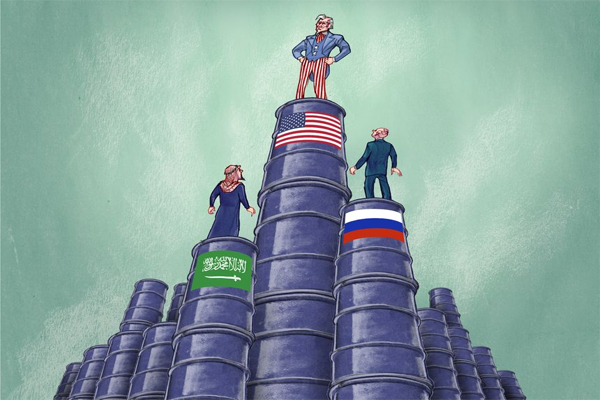U.S. exports limit price increases and help check disruptive behavior by the likes of Russia and Iran.

By Daniel Yergin
While the Ukraine crisis was raising anxiety about Europe’s dependence on Russian natural gas, something remarkable happened. Last month, for the first time ever, U.S. exports of liquefied natural gas to Europe exceeded Russia’s pipeline deliveries. Russian exports, which normally account for about 30% of Europe’s gas use, dropped substantially because of Russian pricing. And with European gas prices about four times as high as normal, U.S. exports surged to fill the gap.
The extraordinary growth in U.S. oil and gas production is a geopolitical and economic asset for the U.S. that contributes to global energy security. As the domestic oil-and-gas industry continues to rebound from the spring 2020 price collapse caused by the onset of Covid, the U.S. is again the world’s top oil producer—almost 20% above the other two largest producers, Saudi Arabia and Russia—and the world’s top natural-gas producer.
The global oil market, which was drowning in oversupply less than two years ago, has tightened dramatically as the world emerges from Covid shutdowns. That makes the market vulnerable to crisis. Russia’s push on Ukraine, a rebounding global economy, major weather events, or a surprise event could send prices soaring.
That is what oil prices above $90 a barrel are signaling. If there is a new nuclear agreement with Iran that brings its oil back to market, that could moderate prices some. But unless a new virulent Covid wave causes more shutdowns (or the Omicron variant slows China’s economy), prices will remain high
The shock absorber for averting crisis is “spare capacity,” the sum of the potential output from wells that is currently not produced but can be turned on during a disruption. Spare capacity has shrunk as the rebounding world economy has pushed demand up and some oil-exporting countries, because of underinvestment, haven’t been able to return to former production levels. Almost all the spare capacity that now exists—about three million to 3.5 million barrels a day—is concentrated in two countries: Saudi Arabia and the United Arab Emirates.
One critical offset to the tightening market is the current upswing in shale output from the U.S., which could add more than 900,000 barrels a day this year. Without the resurgence in U.S. supply, oil prices would likely be even higher.
With new export capacity coming this year, the U.S. will become the world’s largest LNG exporter, ahead of Australia and Qatar. In a tight global gas market, U.S. LNG is critical to avoid a world-wide shortage and keep the lights on in Europe, as demonstrated by the flotilla of tankers headed to Europe.
In the coming months, even if all Russian pipeline exports through Ukraine were cut off, U.S. exports could make up the deficit. But in the unlikely event that Russia cuts off all gas exports to Europe, U.S. exports wouldn’t be enough. Europe would have to scramble, using gas from already-thin storage and restarting coal and nuclear facilities to generate electricity.
America’s position as a top energy producer has provided new influence and greater flexibility. The U.S. imposed sanctions in 2012, for example, that prevented Iranian oil exports to push Iran to negotiate during the runup to the 2015 nuclear agreement. Iran initially scoffed, convinced that keeping its oil out of the market would cause shortages and price spikes that would undermine the restrictions. But Iran was wrong. The rapid growth in U.S. oil production quickly replaced, then exceeded, the bottled-up Iranian oil, forcing Iran to negotiate.
U.S. exports of LNG and oil have been welcomed by countries like Japan and South Korea and have bolstered their energy security and deepened their relationship with America. U.S. exports also have become one of the foundations of Washington’s improved and expanded relationship with India.
But there are limits. Like all assets, this new position needs to be managed wisely. To use the oil and gas supply as a tool or weapon would undermine its reliability and could devalue it.
Today there is no doubting the geopolitical importance of America’s new oil-and-gas position. The Ukraine crisis and Europe’s energy crisis shine a light on the global impact of U.S. oil-and-gas production.
Some saw this significance much sooner than others. At the 2013 St. Petersburg International Economic Forum, Vladimir Putin was on stage with German Chancellor Angela Merkel in front of several thousand people. I asked Mr. Putin how Russia planned to diversify its economy from its dependence on oil and gas export revenues. In the course of asking my question, I mentioned the word “shale.” Before I finished, Mr. Putin reacted sharply, denouncing shale gas as a grave threat that should be stopped.
Reflecting afterward, I realized he had two strong reasons to oppose U.S. shale gas. First, it would compete with Russian gas in Europe. Second, shale gas and oil would enhance America’s global strategic position. Given how events are unfolding in Europe today, one would have to say he was prescient.
Daniel Yergin, vice chairman of IHS Markit, is author of “The New Map: Energy, Climate, and the Clash of Nations.” Energiesnet.com does not necessarily share these views.
Editor’s Note: This article was originally published by The NWall Street journal , on February 14, 2022. All comments posted and published on EnergiesNet.com, do not reflect either for or against the opinion expressed in the comment as an endorsement of EnergiesNet.com or Petroleumworld.
Use Notice: This site contains copyrighted material the use of which has not always been specifically authorized by the copyright owner. We are making such material available in our efforts to advance understanding of issues of environmental and humanitarian significance. We believe this constitutes a ‘fair use’ of any such copyrighted material as provided for in section 107 of the US Copyright Law. In accordance with Title 17 U.S.C. Section 107. For more information go to: http://www.law.cornell.edu/uscode/17/107.shtml.
energiesnet.com 02 15 2022







